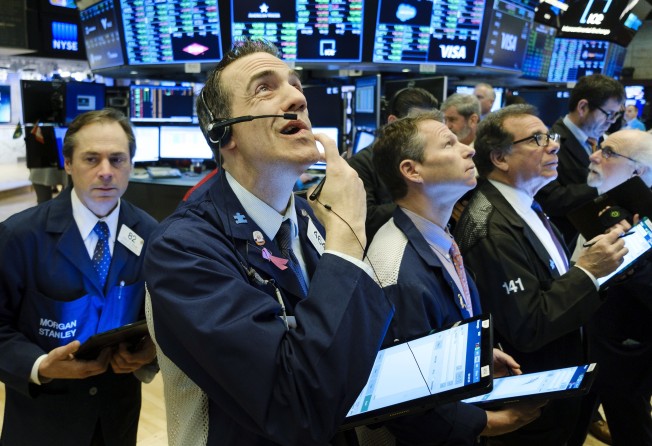Asia stocks fall, led by Japan in gloomy start to new quarter as coronavirus deaths mount
- Hang Seng tumbles 2.2 per cent; HSBC plunges on dividend cancellation
- Gauge of private, smaller China manufacturers shows expansion in March, beating expectations

Most Asia-Pacific stock markets fell Wednesday led by Japan, as investor concerns over the growing toll of the coronavirus pandemic overshadowed improvement in Chinese economic data.
US futures fell 3 per cent, depressing late trading in Asia, including in Hong Kong, which closed down 2.2 per cent, weighed down by British banks and Macau casinos.
That followed a grim warning overnight by President Donald Trump of a “very, very painful two weeks” ahead. The US is becoming a new hotspot, with more than 4,000 deaths, topping China’s total of about 3,300.
Tokyo’s Nikkei 225 plunged 4.5 per cent after its worst quarter since 1987, as business sentiment plummeted and investors remained nervous about a possible lockdown of capital Tokyo, brokers told Agence France-Presse.
HSBC plummeted 9.5 per cent to HK$39.95 – hitting its lowest since March 2009 during global financial crisis – while Standard Chartered tumbled 7.6 per cent. HSBC is the fourth-largest stock on the benchmark in terms of weighting, accounting for 8.5 per cent of the index and the lion’s share of its decline.
Casino stocks fell after gambling revenue plummeted 79.7 per cent in March, according to the Macau gaming authority.
“Expect high volatility in April,” said Kenny Wen, wealth management strategist at Everbright Sun Hung Kai.
China stocks slipped. The Shanghai Composite Index closed down 0.6 per cent, even after small, private manufacturing data in March beat expectations, adding to the surprise gain among large manufacturers in the official gauge reported on Tuesday.
In China, the Caixin/Markit PMI Index rose to 50.1 in March from an all-time low of 40.3 in February, as the world’s second-largest economy battles a slowdown exacerbated by the pandemic. China is expected to be hit by a decline in demand for its goods as lockdowns around the globe weaken consumption.
“Stock markets are reacting to what now seems to be a likely increase in the duration and breadth of coronavirus lockdowns in the US and elsewhere, which is pointing to a potentially deeper and longer-term hit to economic activity than was anticipated even a week ago,” said Stephen Innes, chief global strategist at currency trading platform AxiCorp.
South Korea’s Kospi Index tumbled 3.9 per cent while the tech-heavy Kosdaq shed 3 per cent, after a government report showed exports slipping more than expected by 0.2 per cent in March from a year earlier.
Australia’s S&P/ASX200 closed up 3.6 per cent while New Zealand’s S&P/NZX50 rose 1.3 per cent.
In Japan, the new Manufacturing Purchasing Managers’ Index fell to a seasonally adjusted 44.8 from 47.8 in February, its lowest point since April 2009. A reading of below 50 signals contraction.
The Bank of Japan’s March Tankan business survey – a quarterly poll of about 10,000 companies – showed a reading of minus 8 among major manufacturers, the first negative reading since March 2013.
The US economy is now the focus of the pandemic as officials predict the US death toll could rise to 100,000 to 240,000, even with social distancing guidelines. Shocking televised scenes are emerging out of the US.
“It’s merely a case of unprecedented economic devastation that is hitting the screens where scenes from New York City in full stop are providing the horrific optics,” Innes said.
Investors should expect to be “tethered to the risk yo-yo, if not anvil, for some time to come,” he added.
Globally, more than 41,000 people have died, and one third of humankind is on lockdown.
Wednesday marks the start of a new quarter, after the first three months were horrible due to the virus, which upended supply chains, ground air travel to a halt and upended businesses.
The Hang Seng Index lost 16.3 per cent last quarter, having fallen into a bear market in mid-March. The Shanghai Composite Index fell almost 10 per cent, while benchmarks in Japan, Korea and Australia lost about 20 per cent. The Dow crashed to its worst quarter since 1987.